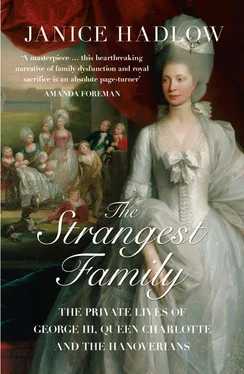Britain’s confidence on the international stage was mirrored by a similarly robust sense of self-worth at home. César de Saussure, a Swiss traveller who visited Britain in 1727, was struck even then by the unshakeable sense of pride the British displayed in themselves and all their works: ‘I do not think that there is a people more prejudiced in its own favour than the British people. They look upon foreigners in general with contempt and think nothing is done as well elsewhere as it is in their own country.’ 5The British had no difficulty in identifying the source of their good fortune: their political liberty, guaranteed to them by birthright and history, and enshrined in a constitutional settlement which protected them equally from the despotism of absolutist kings and the anarchy of the mob. De Saussure observed that the English ‘value this gift more than all the joys of life, and would sacrifice everything to retain it’. Nor was this passionate attachment confined to the political classes. Even the poor, who could not vote, ‘will give you to understand that there is no country in the world where such perfect freedom may be enjoyed as in England’. 6
Liberty was not an unmixed blessing, however. Whilst foreign visitors found much to admire in the constitutional freedoms the British enjoyed, they were far more ambivalent when confronted with the impact of these ideas on the mass of the population. The assertive, aggressive, unapologetic behaviour of the urban poor, particularly in London, shocked observers used to more decorous (or more cowed) communities. De Saussure thought ordinary Londoners disrespectful, rowdy and threatening, ‘of a very brutal and insolent nature, and very quarrelsome’. He was horrified by their habitual drunkenness and casual violence, but was most disturbed by their lack of respect for their social superiors. He noted – perhaps as a result of painful personal experience – that a finely dressed man, especially one ‘with a plume in his hat or his hair tied in a bow’, risked verbal abuse and worse if he walked alone through the poorer streets. On holidays such as Lord Mayor’s Day, ‘He is sure, not only of being jeered at and being be-spattered with mud, but, as likely as not, dead dogs and cats will be thrown at him, for the mob makes a provision beforehand of these playthings, so that they may amuse themselves with them on the great day.’ 7
The energetically expressed opinions of the crowd frequently went far beyond contempt for the sartorial pretensions of the rich. Mobilised in large numbers, the freeborn Englishman was given to demonstrations of popular feeling that were often violent. Issues of political and religious controversy (particularly those which were thought to undermine the dual foundations of British freedom – the Protestant settlement and a limited monarchy) brought men and women on to the streets to make their views loudly known. Throughout the eighteenth century, the threat of disorder and disturbance was as much a part of the life of British politics as the parliamentary vote. As they went about the process of government, the great and the good were abused, threatened and sometimes physically manhandled; parades were staged, effigies burnt, stones thrown, windows broken, carriages overturned, property destroyed; there were injuries and sometimes deaths. The practice of liberty could be a rough business on the streets of George III’s Britain.
If Britain in 1760, was a volatile and sometimes intimidating place, it was also an increasingly wealthy one. Almost every visitor commented on the general air of comfortable prosperity that manifested itself in the clean and well-appointed private houses, the luxurious inns and, above all, in the quality of the roads. Unlike most European highways, these were well engineered and very extensive, linking not just the great cities, but smaller market towns and villages. They were paid for by tolls, and regularly maintained. Foreigners were amazed to discover that travel, such an ordeal everywhere else, had in large areas of England become a leisurely communal pleasure. One bemused observer noted that even on a Sunday evening, the roads outside London were packed with people on the move, visiting, travelling, or simply taking the air. ‘Carriages of every kind … succeeded each other without interruption and with such rapidity that the whole picture looked like magic; it certainly showed a degree of wealth and extent of population, of which one had no notion in France.’ 8
From the moment of their arrival, travellers to Britain were struck by the sheer busyness of the place. They were astonished by the air of perpetual activity, not just on the roads, but in the teeming streets; in the ports dominated by the masts of tightly packed ships; on the new canal systems, thronged with burdened barges; in the parks and pleasure gardens, where rich and poor mingled in huge numbers in pursuit of a good time. In fact, mid-eighteenth-century Britain had yet to experience the rapid growth in population that would see its towns and cities grow to unprecedented size in the next hundred years. There were around 7.5 million people living in England, Scotland and Wales in 1750. France, a much larger country, supported far greater numbers; in the same year, its population reached 25 million. The universal impression of Britain as a crowded, bustling community arose less from the absolute numbers of its inhabitants than from a far more significant development – the extraordinary size and influence of its capital city.
Although Britain was not yet a heavily populated country, it was already a strongly metropolitan one. London doubled in size between 1600 and 1800; by the end of the seventeenth century, it was the largest city in western Europe. By 1750, only 2.5 per cent of Frenchmen lived in Paris; in comparison, London housed 11 per cent of the population. 9An unprecedented proportion of Britons were Londoners, whether by birth or immigration. Still more had some experience of metropolitan life, even if they subsequently left it behind them. It has been calculated that one in six of the population of mid-eighteenth-century Britain had lived in London at some stage in their lives. 10The magnetic attraction of the capital was overwhelming, especially to foreign visitors. Most travellers went straight there, and few ventured beyond the southern counties which were already becoming the capital’s dependent hinterlands. Their experiences were dominated by the time they spent in the capital, which shaped profoundly their perceptions of the country as a whole.
The lure of London was not confined to foreigners. Like so many other ambitious young men of the time, James Boswell was convinced that the only proper existence for an eager striver like himself was one lived to the full in London. He could not wait to leave his native Edinburgh behind and embrace all the possibilities London offered. Arriving at its outskirts in 1762, he was beside himself with anticipation, declaring that ‘I was all life and joy!’ As his carriage descended Highgate Hill, ‘I gave three huzzas and we went briskly in.’ 11It was Boswell’s great patron Samuel Johnson – himself a grateful emigrant from the staid Midlands – who famously linked the appetite for London’s pleasures to the enjoyment of life itself. From his first arrival in town, Boswell did all he could to demonstrate the truth of Johnson’s observation. Subject headings from the index to the London Journal that Boswell wrote during his stay between November 1762 and August 1763 give a taste of the capital’s gamey appeal: ‘Artists exhibitions, billiards, bleeding, Bow St magistrates court, card-playing, catch singing, circulating library, cock-fighting, concert, damning a play, Guards on parade, horseback rides, intrigues, Newgate prison, prostitution, royal menagerie, Mrs Salmon’s waxworks, surgeons and their fees, Tyburn, execution at, watermen rowing for prizes.’ 12
Читать дальше












